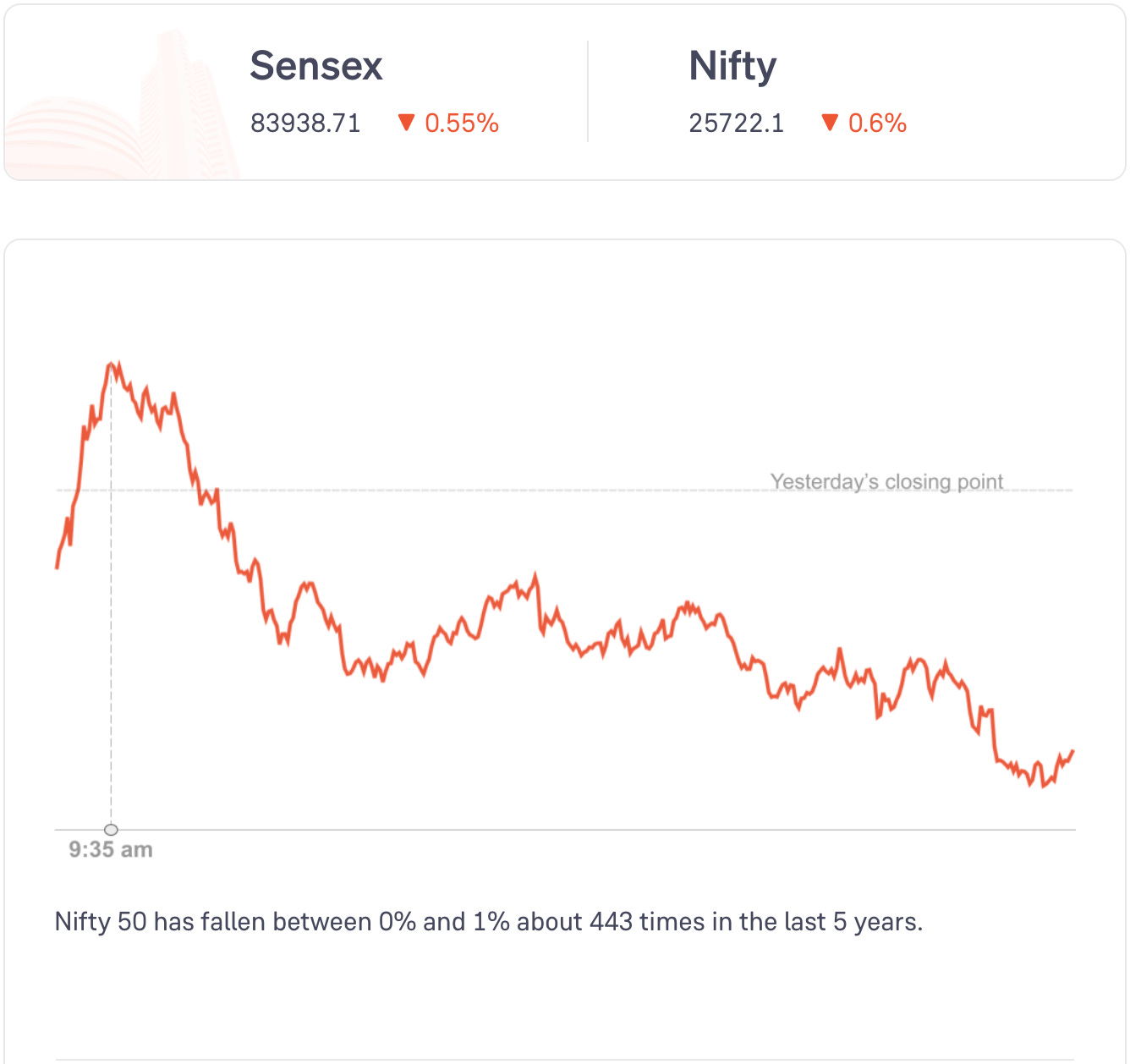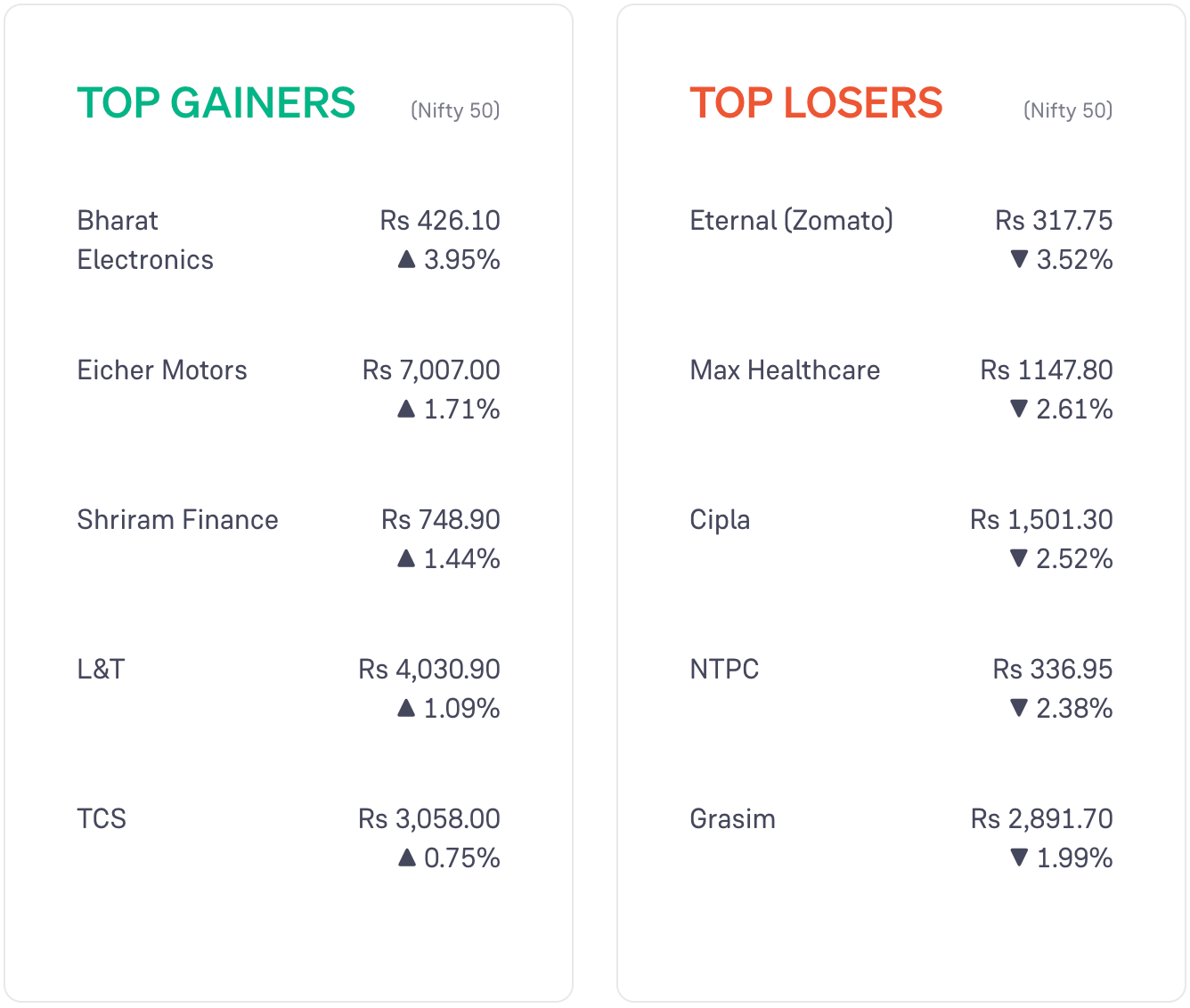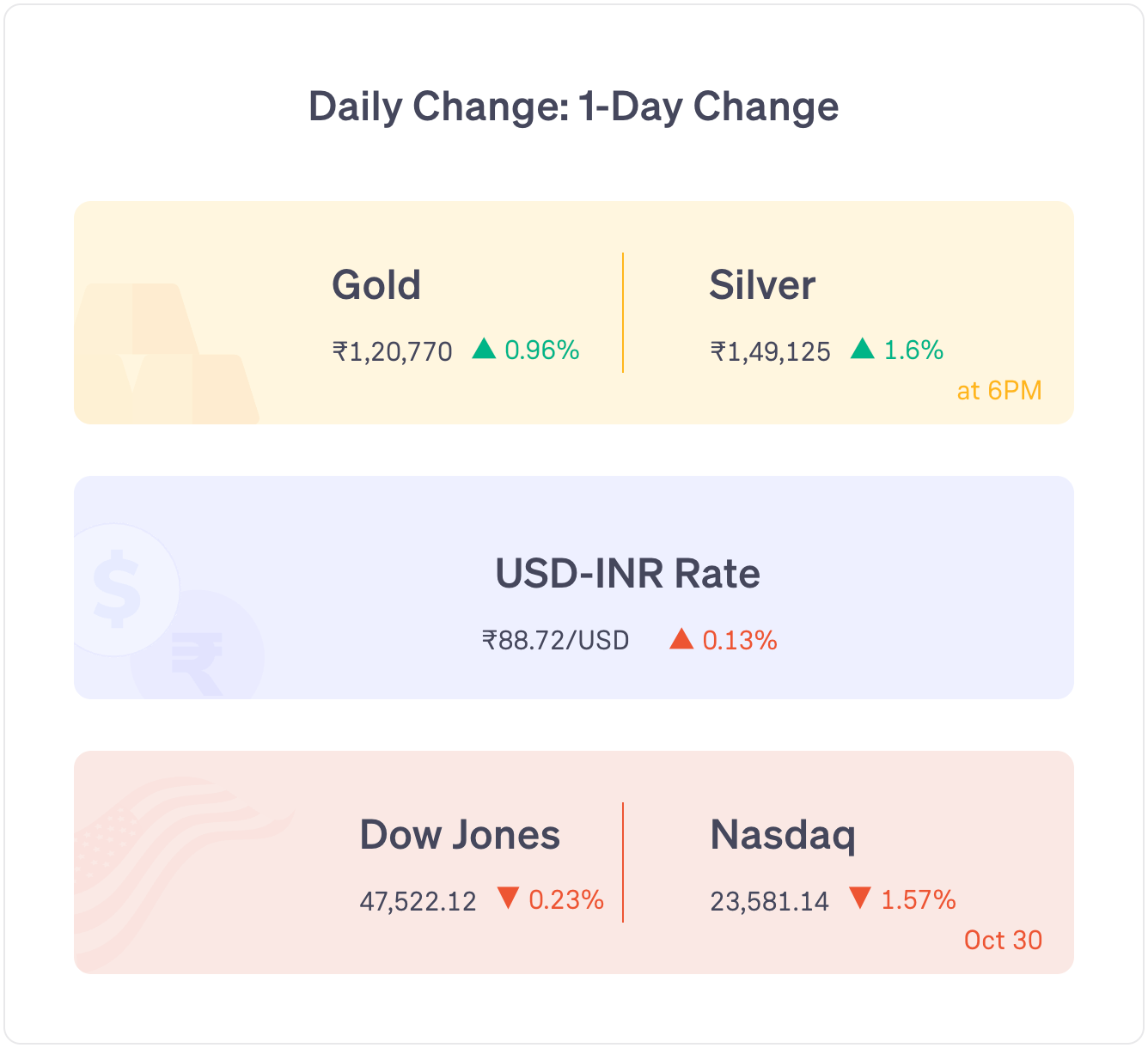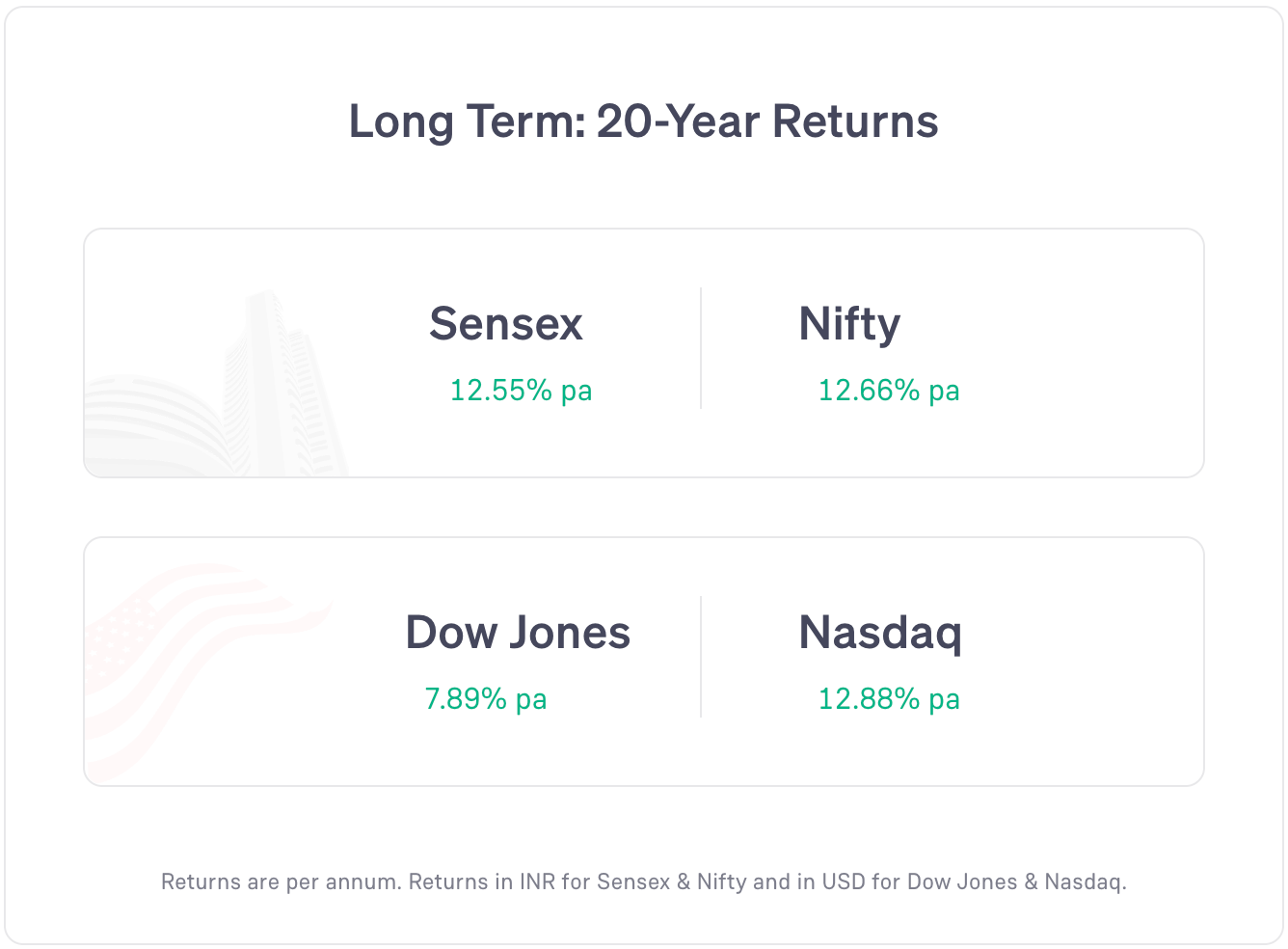Nifty Bank Index to add 2 more stocks, India-US defence deal, & more — Groww Digest
Friday, 31 October 2025
Markets opened below yesterday’s closing point.
Nifty 50 fell in the first half of the day, stayed in a range after that and closed in the red.
All sectors’ stocks fell today except for the PSU bank stocks and oil and gas stocks. Media stocks and metal stocks fell the most.
Global markets: US markets fell. Most Asian markets fell. Most European markets fell (as of 6 pm IST).
News
SEBI issued new norms for non-benchmark indices used for derivatives trading. The indices must have at least 14 stocks, with the top stock’s weight capped at 20% and the top 3 at 45%. Nifty Bank Index will expand from the existing 12 to 14 stocks in 4 phases by March 2026. Nifty Financial Sevices and BSE Bankex have to comply by 31 Dec.
India and the US signed a 10-year defense framework agreement, to expand military and technological cooperation.
India’s forex reserves fell by $6.92 billion to $695.36 billion in the week that ended on 24 Oct.
Lenskart IPO has been subscribed 1.13 times. Retail subscription: 1.31 times. IPO closes on 4 Nov.
Orkla IPO was subscribed 48.73 times. Retail subscription: 7.05 times. IPO is closed for subscription.
Note: we will not be covering any news related to Groww IPO till the listing date (12 Nov) due to legal/conflict-of-interest reasons#
Stocks Updates
Hero Moto: acquired a 26% stake in Clean Max Karakoram to develop a solar power wheeling project for its Dharuhera and Gurugram plants.
L&T: and US-based General Atomics will jointly manufacture MALE RPAS (aircraft systems) in India for the defence forces. L&T will act as the prime bidder for the Defence Ministry’s 87-drone program.
Maruti Suzuki: net profit rose 8% year-on-year to Rs 3,349 crore in the July-Sept quarter.
Bharat Electronics: net profit rose 18% year-on-year to Rs 1,288 crore in the July-Sept quarter.
Bharat Petroleum: net profit rose 170% year-on-year to Rs 6,191 crore in the July-Sept quarter. Dividend declared: Rs 7.5 per share; record date: 7 Nov.
Bank of Baroda: net profit fell 4% year-on-year to Rs 5,134 crore in the July-Sept quarter. Net NPA fell to 0.57% (from 0.6% last year).
Shriram Finance: net profit rose 7% year-on-year to Rs 2,314 crore in the July-Sept quarter. Dividend declared: Rs 4.8 per share; record date: 7 Nov.
GAIL: net profit fell 27% year-on-year to Rs 1,972 crore in the July-Sept quarter.
Godrej Consumer: net profit fell 7% year-on-year to Rs 459 crore in the July-Sept quarter. Dividend declared: Rs 5 per share; record date: 7 Nov.
Word of the Day
Fiscal Stimulus
It is the government’s action to boost economic activity during a slowdown
This can be done by increasing public spending (like building infrastructure, giving subsidies, or cash transfers) or by cutting taxes so that people and businesses have more money to spend.
The aim is to create jobs, increase demand, and eventually revive economic growth.
Example: the Indian government introduced a fiscal stimulus package during the Covid 19 pandemic to help the economy recover.
6 Day Course
Theme: red flags while choosing stocks
Day 5: Friday
One of the biggest red flags is overvaluation.
After you have filtered companies for quality of management, accountability, debt, and others, you are actually left with a set of companies that are very clean.
But there’s a different red flag that a company’s management cannot do much about.
Many times, good companies get investment from many investors. This pushes the share price up.
After a certain limit, it reaches an overvalued state. At a very high value, investors may not make a lot of returns even if the underlying company is doing great.
Investors must avoid investing in overvalued stocks.
This is unfortunately not easy.
PE ratio is used by many to judge if a company is overvalued. That’s a good starting point but should not be treated as the only factor.
Future revenue, growth, human factors, customer preferences, etc must all be taken into account while trying to estimate if a company is overvalued or not.
Features Question
“A company raises capital for future growth, then why is it that IPOs today are majorly OFS and the fresh issue part is just for namesake. Is it just to gain exponential for the early age investors at the expense of the retail investor”IPOs have two kinds of shares:
Fresh issue: new shares are created and sold to IPO investors
OFS: Offer for Sale. It allows existing investors to sell their shares to IPO investors. No new shares are created in this process.
In a fresh issue, the money from the share sale goes to the company. It can use this for future growth.
In OFS, the money goes to existing investors who are selling shares. The company does not get this money.
These days, many IPOs consist of OFS + fresh issues.
One reason for OFS is that early investors (like venture capitalists) who invest in the early days of a start up want to take out money.
Many of them would have invested many years ago and want a return on their investment.
Often, these early investors push for an IPO because it allows them a way to encash their earnings.
Many of these companies have enough money for future growth and do not need any money.
Such companies’ IPOs have little to no fresh issue shares.
Now the question arises: why would early investors sell if the company’s future is good?
Different investors have different goals.
Early stage investors like extremely high-risk but high-growth investments.
They might not like the relatively slower growth experienced by listed companies.
This does not mean the company will not continue doing well.
Is only OFS a bad sign?
It is not necessarily a bad sign.
Many investors see IPOs with no fresh issue and only OFS as a strong signal — that the company does not need more money.
In case of venture invested companies, this is bound to happen.
Such early stage investors sell their shares during the IPO and use that money to invest in other small start-ups.
Unfortunately, there have been cases where companies with poor financial and business health had an IPOs to let early investors sell and exit.
In such cases the IPO investor does not gain much or may also suffer losses.
This is one of the main reasons why blindly investing in IPOs is never a good idea.
Investors should read the IPO documents (DRHP) carefully and understand the business and health of a company.
They must also try to understand if a company’s IPO price is overvalued, fairly valued, or undervalued.
Even healthy businesses can be overvalued. Investing in overvalued shares can give low returns.
Most companies do a fresh issue + OFS in IPOs because they need to raise some money while also letting early investors exit.
Many also do it simply to gain reputation. Doing an IPO ensures that companies are well audited regularly.
This brings in greater transparency and trust.
Disclaimer
#The disclosures made through our platform are for information purposes only, and do not constitute an invitation or offer or an invitation to offer to acquire, purchase or subscribe to the equity shares of Billionbrains Garage Ventures Limited (“Company”). Any potential investors should note that investment in equity shares involves a high degree of risk and should rely on their own examination of the red herring prospectus filed by the Company, containing the details of the initial public offering, including the risks involved, before making any investment decision. The red herring prospectus filed by the Company shall be available on the website of the SEBI at www.sebi.gov.in, the websites of the Stock Exchanges at www.bseindia.com and www.nseindia.com, respectively, the website of the Company at www.groww.in and the website of the BRLMs, i.e. Kotak Mahindra Capital Company Limited, J.P. Morgan India Private Limited, Citigroup Global Markets India Private Limited, Axis Capital Limited and Motilal Oswal Investment Advisors Limited at https://investmentbank.kotak.com, www.jpmipl.com, www.citigroup.com/global/aboutus/globalpresence/india/regulatory-disclosures-investment-banking, www.axiscapital.co.in and www.motilaloswalgroup.com respectively.
The Equity Shares have not been and will not be registered, listed or otherwise qualified in any other jurisdiction outside India and may not be offered or sold, and Bids may not be made by persons in any such jurisdiction, except in compliance with the applicable laws of such jurisdiction. The Equity Shares have not been and will not be registered under the US Securities Act of 1933 (“U.S. Securities Act”) or any state securities laws in the United States and may not be offered or sold within the United States, except pursuant to an exemption from, or in a transaction not subject to, the registration requirements of the U.S. Securities Act and in accordance with any applicable United States state securities laws.
Did you like this edition?
Leave a feedback here!





